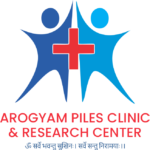Pregnancy is a beautiful phase in a woman’s life, but it can also bring along certain discomforts and health issues. One such condition that commonly affects pregnant women is piles, also known as hemorrhoids. Piles refer to swollen blood vessels in the rectal area, which can cause pain, itching, and discomfort. In this blog, we will delve into the causes of piles in pregnancy and explore conservative management approaches based on insights from Arogyam Piles Clinic and Research Center in Mohali, Chandigarh.
Causes of Piles in Pregnancy:
During pregnancy, the body goes through numerous hormonal and physiological changes. These changes, combined with increased pressure on the pelvic region, contribute to the development of piles. Some common causes of piles in pregnancy include:
- Increased Pressure: The growing uterus exerts pressure on the rectal area, leading to the swelling of blood vessels.
- Hormonal Changes: Hormonal shifts during pregnancy can affect the blood vessels’ elasticity, making them more prone to swelling.
- Constipation: Pregnancy hormones can slow down the bowel movements, resulting in constipation. Straining during bowel movements puts additional pressure on the rectal area, exacerbating the risk of piles.
- Weight Gain: Pregnancy-related weight gain increases the overall pressure on the pelvic area, contributing to the development of piles.
Conservative Management Approaches:
- Dietary Modifications: Arogyam Piles Clinic emphasizes the importance of a fiber-rich diet to prevent and manage piles during pregnancy. Including foods such as fruits, vegetables, whole grains, and legumes can promote regular bowel movements and prevent constipation. Adequate hydration is also essential to maintain soft stools.
- Good toilet habits: Pregnant women should avoid straining during bowel movements. It is recommended to respond to the natural urge to pass stools promptly. Additionally, using a squatting position or a small stool to elevate the feet can help in reducing strain during defecation.
- Warm Sitz Baths: Taking warm sitz baths for 10-15 minutes a few times a day can provide relief from pain, itching, and discomfort associated with piles. Arogyam Piles Clinic suggests using warm water and avoiding harsh soaps or chemicals in the bathwater.
- Topical Treatments: The application of over-the-counter hemorrhoid creams or ointments containing witch hazel or hydrocortisone can help soothe the inflamed area and alleviate symptoms. However, it is important to consult a healthcare professional before using any medications during pregnancy.
- Kegel Exercises: Kegel exercises, which involve contracting and relaxing the pelvic floor muscles, can improve blood circulation in the rectal area and help prevent piles. Arogyam Piles Clinic recommends consulting with a healthcare provider to learn the correct technique for performing Kegel exercises during pregnancy.
- Regular Physical Activity: Engaging in regular exercise, as advised by a healthcare professional, can promote healthy bowel movements, regulate weight gain, and improve overall circulation. Low-impact activities like walking, swimming, and prenatal yoga are beneficial for pregnant women.
- Avoiding Prolonged Sitting or Standing: Pregnant women should avoid sitting or standing for extended periods as it can increase pressure on the rectal area. Taking breaks, changing positions frequently, and using cushions or pillows for support can help alleviate discomfort.
Conclusion:
Piles during pregnancy can cause significant discomfort, but with proper management approaches, expectant mothers can find relief and prevent worsening of symptoms. Arogyam Piles Clinic and Research Center in Mohali, Chandigarh, offers valuable insights into the conservative management of piles during pregnancy. By incorporating dietary modifications, practicing good toilet habits, utilizing sitz baths, and following the recommended exercises, pregnant women can effectively manage piles and enjoy a healthier and more comfortable pregnancy journey.
Disclaimer: The information provided in this blog is for informational purposes only and should not be considered as medical advice. Pregnant women should always consult with their healthcare provider for personalized guidance and recommendations concerning their specific condition.



